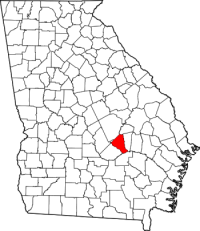A reopened rural hospital has reached a milestone in its effort to regain its financial footing.
The Georgia Department of Community Health has restored the Medicaid provider number for Lower Oconee Community Hospital, in the South Georgia town of Glenwood, allowing it again to bill the government insurance program.
Clyde Reese, the DCH commissioner, told Georgia Health News recently that pending an upcoming state licensure decision, Lower Oconee could probably have its ability to bill Medicare restored as well.
“We’re going to give them a chance to operate,’’ Reese said.
The new owner of the Wheeler County hospital, meanwhile, said Monday that he is optimistic that Lower Oconee will not only survive but even become a model for rural health care.
In February, Lower Oconee became the fourth rural Georgia hospital to close in the past two years. The struggles of such rural hospitals have become a political issue in this election year.
Their financial troubles have also raised questions about Georgia’s decision not to expand its Medicaid program under the Affordable Care Act.
Lower Oconee, a 25-bed “critical access” hospital, still owes the Medicaid program $1.3 million. Reese said it has agreed to a 12-month repayment plan of that liability.
Norman King, the new owner, told GHN on Monday that Lower Oconee has hired new medical staff and is looking to offer additional medical services.
King, who maintains that the Wheeler County hospital went “on diversion’’ rather than closing, said he’s confident of its future. “If I was hesitant in the least, I would have never undertaken this endeavor,” King said.
He did not disclose the purchase price for Lower Oconee.
The matter of Medicaid
King said Medicaid expansion, if it were enacted in Georgia, could help the hospital. “But I’m not going to say it’s going to be the answer to all our problems,’’ he added.
Georgia’s rural hospitals treat many poor and uninsured people, one of the reasons for these hospitals’ financial problems. Medicaid expansion would extend coverage to many of these people.
The federal Affordable Care Act calls for states to expand their Medicaid programs, but the Supreme Court ruled in 2012 that they are not obliged to do so. Roughly half the states have rejected expansion, saying it would be too costly, and Georgia is among them.
Three for-profit hospital chains that operate in Georgia recently reported that they have seen a significant financial impact in states that have expanded Medicaid.
HCA, which has facilities in 20 states, including Georgia, reported a big difference in Medicaid and uninsured admissions between expansion and non-expansion states, the Washington Post reported. The company said it has seen Medicaid admissions growth and a 29 percent decline in uninsured admissions in states that expanded, compared to a 5.9 percent increase in uninsured admissions in non-expansion states.
Tenet Healthcare, which also operates hospitals in Georgia, reported that it had a 17 percent increase in Medicaid inpatient visits while uninsured visits decreased 33 percent in the four expansion states where it operates. In non-expansion states, Medicaid admissions dropped 1 percent as uninsured care rose 2 percent, Tenet said.
And Community Health Systems said that in expansion states where it operates, self-pay admissions dropped 28 percent while Medicaid admissions increased by 4 percent.
Matt Caseman, executive director of the Georgia Rural Health Association, said Tuesday that expanding Medicaid would provide thousands of rural Georgians access to a primary care doctor.
“It will reduce the burden of uncompensated care and help keep the doors open for our safety net providers,” said Caseman, who welcomed the news of Lower Oconee’s progress.
“The major threat to rural health care right now is keeping these rural hospitals open,’’ Caseman said. “In many cases, once they shut down the doctors leave, the pharmacy closes and the town loses other vital health care services.”
Trying other measures
Recent polls indicate most Georgians support Medicaid expansion.
Gov. Nathan Deal, though, has not wavered in his opposition to expansion. He said in an AJC editorial that expansion “wouldn’t be a slam-dunk win even for low-income Georgians.”
“Coverage isn’t the same as access,” Deal said. “Those kicked off their private health insurance would now have little choice in coverage or doctor and would have to wait to see the limited number of providers willing to accept Medicaid, which reimburses below the cost of care.”
Deal has recently pushed new licensure rules for rural hospitals that have recently closed or are in financial distress. Through a state rule change, these hospitals now will have the ability to convert to freestanding emergency departments, which could also offer surgery and obstetric services.
DCH’s Reese said the agency can begin receiving such applications from rural hospitals May 19.


